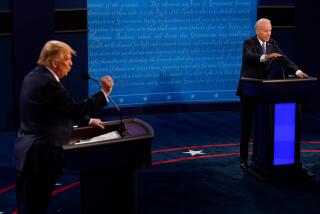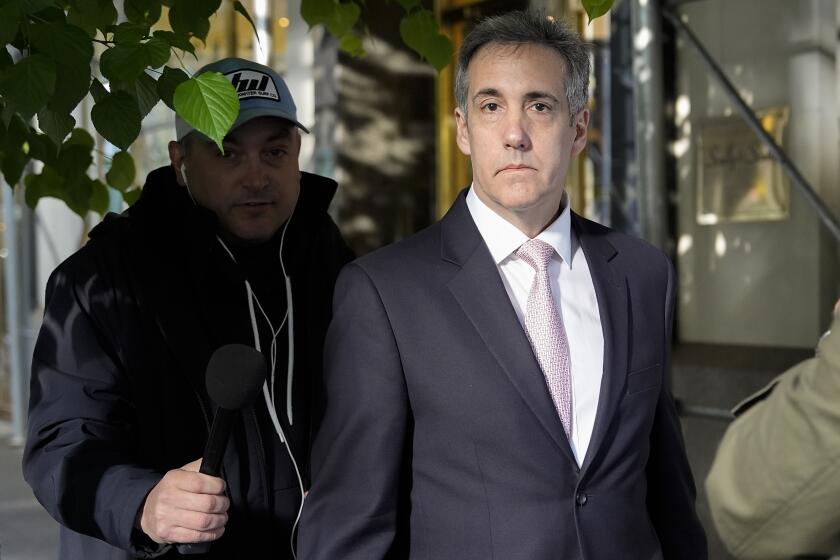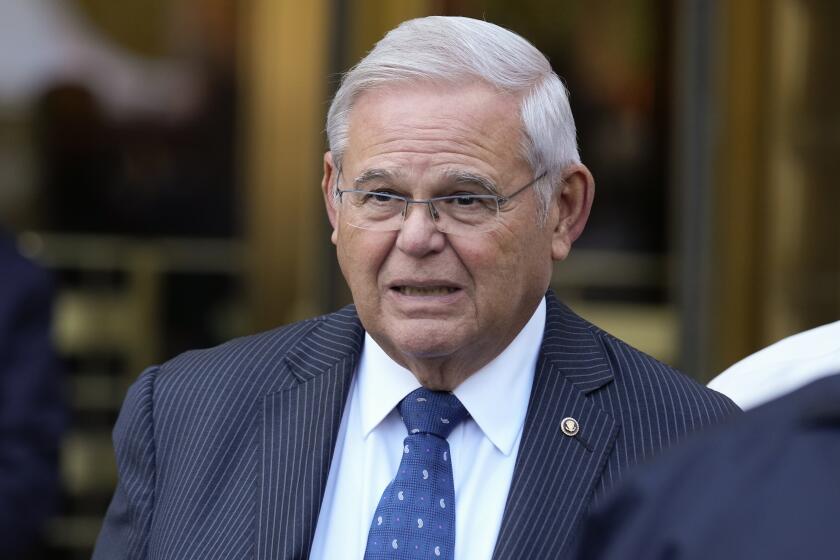Blair Sets a Date -- of Sorts -- for Resigning
Prime Minister Tony Blair moved Thursday to defuse the biggest revolt within his party since he took office more than nine years ago by pledging to step down within the next 12 months.
But the Labor Party head, showing the dexterity that has enabled him to maintain power for so long in the turbulent world of British politics, refused to set a precise timetable for concluding his term amid demands that he depart quickly. Blair also forced challenger Gordon Brown to back down from a public confrontation or risk fatally damaging the party’s prospects in the next elections.
But it was far from a victory for Blair. Acknowledging that the last week “has not been our finest hour,” the prime minister was compelled to start the clock running on the waning months of his administration to head off the rapidly escalating rebellion in Labor ranks.
It is a process he had resolutely resisted in the past, fearful it would diminish his authority as he attempted to leave his final mark on issues including the Middle East peace process, global warming, nuclear energy and healthcare reform.
“I’d prefer to do this in my own way,” Blair said Thursday. “What is important now is that we understand that it is the interests of the country that come first, and we move on.”
Bowing to the pressure within his party, the prime minister announced that he would not be leading the next Labor Party conference in September 2007, but he stonewalled those demanding a blueprint for an earlier departure. “I’m not going to set a precise date now. I don’t think that’s right. I will do that at a future date, and I will do that in the interests of the country, and depending on the circumstances of the time.”
Chancellor of the Exchequer Brown, who has been in line to succeed Blair as Labor Party chief -- and who had reportedly urged Blair to commit himself to stepping down as early as March -- shunned a public confrontation and instead announced, about an hour before Blair’s statement, that the decision was Blair’s to make.
Blair long ago made it clear that he would not seek a fourth term, but the Labor Party’s plummeting poll numbers in the wake of the Iraq war have made Brown and other Labor lawmakers fearful of waiting until 2009 to install more popular leadership. Still, Brown said he would not, for the moment, be leading a palace coup.
“I want to make it absolutely clear today that when I met the prime minister yesterday, I said to him, as I have said to him on many occasions, and I repeat today, that it is for him to make the decision,” Brown said.
“I said also to him, and I make clear again today, that I will support him in the decisions he makes,” he added. “We continue to work together because we share a determination, both of us, that we will advance and get down to the business of a Labor government and doing our best by the people of the country.”
The two low-key statements -- Blair looked calm, if a bit dejected; Brown appeared resigned -- followed days of near paralysis in London as television and the press focused single-mindedly on the tense meetings between the two men playing out behind closed doors on Downing Street.
British newspapers described the discussions as “hostile” and “appalling.” The Blair camp accused Brown and his supporters of “blackmail” and a “coordinated coup attempt,” according to the Guardian, and despite Brown’s apparent unwillingness to fight it out in public, it was unclear by late Thursday whether Blair’s other critics within the Labor Party were equally ready to back away from the brink.
“I don’t think it took us any further at all,” Labor lawmaker Graham Stringer said of Blair’s 12-month timetable in a statement to the BBC.
“I think the only thing that will take us out of this and stabilize [the situation] is to have a straightforward, open and honest leadership election between Gordon Brown and whoever will stand against him.”
But many in the party -- fearful that the intramural bloodletting would guarantee little but a Conservative Party victory in the next elections -- expressed relief that open warfare had been averted, at least for the moment.
“What you’ve got to realize is there’s some people within the Labor Party who wanted Tony Blair to go the day he got elected. And they will never be satisfied by anything short of Blair pulling out a samurai sword and shoving it into his stomach,” Labor lawmaker Stephen Pound said in an interview.
“This won’t be enough to satisfy those who are incapable of being satisfied,” he said. “But for most reasonable people, who are willing to give him the benefit of a little dignity, and to choose the time of his going, it’s more than enough.”
Brown succeeded in getting a public commitment from Blair to leave within a year by making it clear that he could be forced to leave much sooner, analysts said. But Brown appears to have decided not to force Blair’s hand on a stepped-up timetable, they said, because of fears that a public brawl between the two leaders would damage the party and alienate voters.
“Brown’s people are horrified at the civil war going on, because it renders the thing to be inherited less valuable,” said Tony Travers, professor of politics at the London School of Economics. “This is a problem for them. It is not a problem for Blair.”
On the other hand, he said, “Gordon Brown’s people will feel that there’s a much lesser chance now than before that Blair will be playing some kind of game with them, where he keeps every six months moving his time of departure a little further away.”
Although Blair apparently hopes to hang on through his 10-year anniversary in May, Brown has indicated he expects a greater role in choosing personnel and shaping policy, and many Labor lawmakers in shaky districts will push for a hand-over much sooner than next September.
More to Read
Start your day right
Sign up for Essential California for news, features and recommendations from the L.A. Times and beyond in your inbox six days a week.
You may occasionally receive promotional content from the Los Angeles Times.






